Instructors from five architecture schools awarded the ACSA's 2023 Timber Education Prize
By Josh Niland|
Thursday, Aug 31, 2023
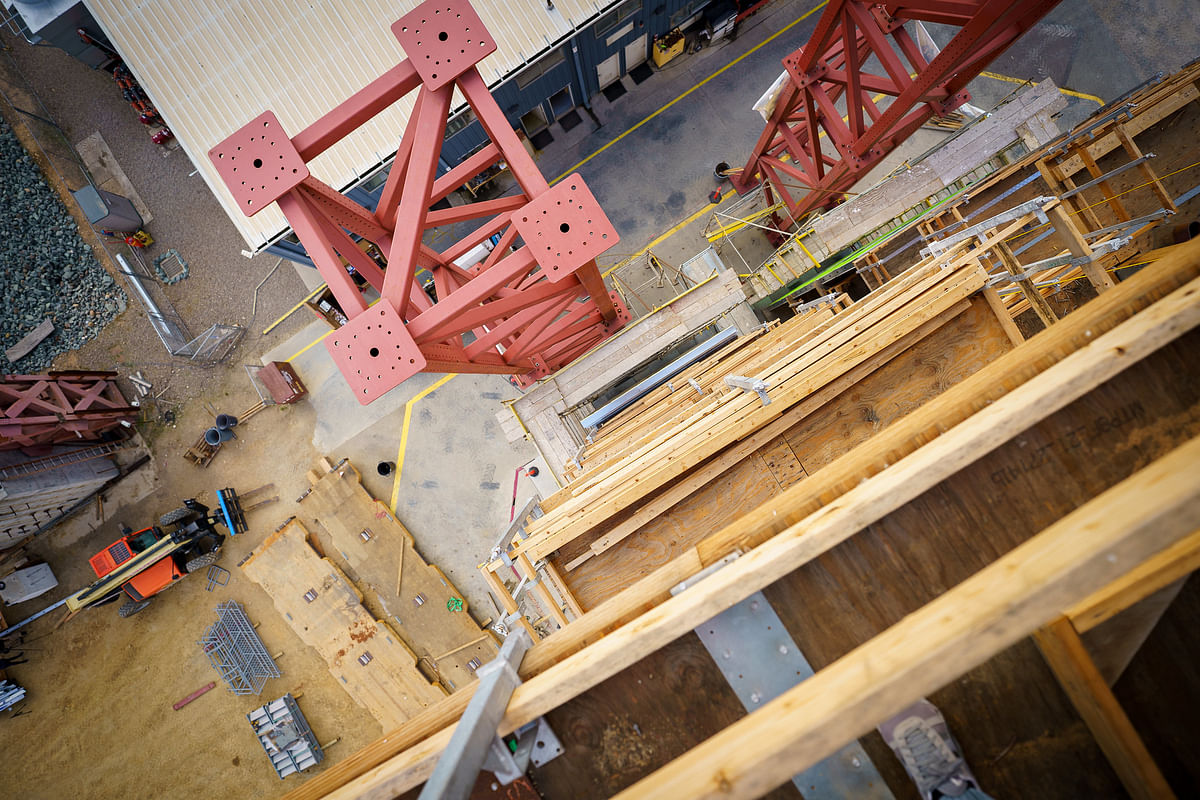
Related
The Softwood Lumber Board, in conjunction with the Association of Collegiate Schools of Architecture (ACSA), has announced five winners as part of the 2023 Timber Education Prize.
The Prize recognizes innovations in the instruction of architecture courses in North American universities that will ultimately lead to a greener future thanks to their abilities to engender a "stimulating and evidence-based environment for learning about timber."
The ASCA shares: "These innovative courses will be taught at architecture schools across North America in the coming years. These courses seek to recognize effective and innovative curricula that create a stimulating and evidence-based environment for learning about timber. The use of wood as a building material can achieve multiple design, construction, and performance objectives. Therefore, these courses equip students with the knowledge and design skills to achieve green building goals in a range of project type."
The jury selected five courses to receive a cash prize along with further support for implementation at their host institutions within the next two academic years. Honorable Mentions were selected as well. The winners will be presented at the 2023 ACSA/AIA Intersections Research Conference in October in Amherst, Massachusetts.
Scroll down to hear more about the five winning courses.
UDBS AR Home Lab: STREET LEGAL
Instructors: John Folan & Candice Adams from the University of Arkansas
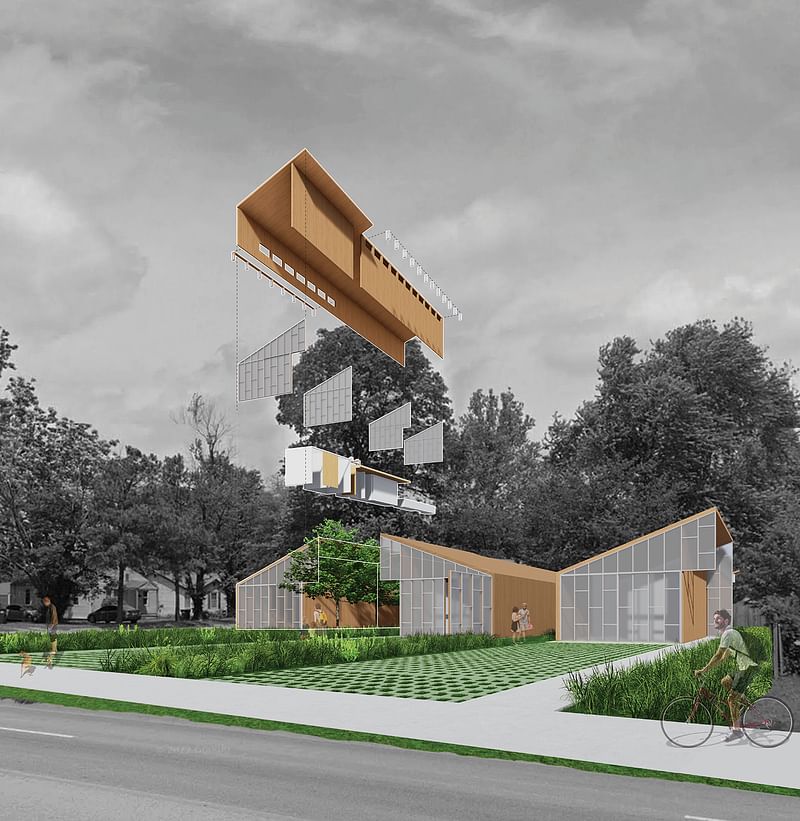
Description: "With nearly 19 million acres of forest land in Arkansas constituting 56% of land cover, architectural design that utilizes wood and timber construction provides a significant opportunity to impact the state’s economy. The Fay Jones School of Architecture + Design Urban Design Build Studio (UDBS) has initiated exploration of innovative mass timber technologies that capitalize on the abundance of wood products materialized within the state.
Specifically, the STREET LEGAL advanced design-build studio will explore the potential of Wave Layered Timber (WLT) as a viable enclosure/structural system to address the affordable housing crisis in the Northwest Arkansas Metropolitan Region. The prototype designed and constructed through the studio will demonstrate the use of the technology for the first time in the United States, offering an opportunity to influence broader-scale implementation by making it STREET LEGAL." Read more here.
It Takes a Village: Modular Mass Timber and New Housing ImaginariesInstructor: De Peter Yi from the University of Cincinnati
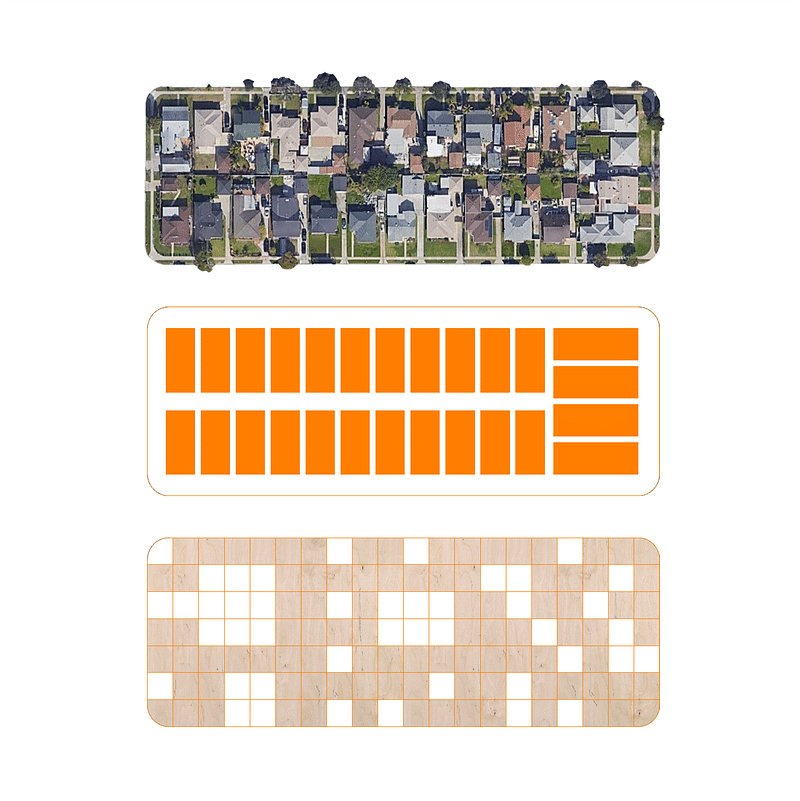
Description: "Throughout history and across cultures, the use of timber has cultivated an intricate relationship with our living spaces. While modernist imaginaries embraced the new capabilities of concrete, steel, and glass, timber persists as the material that houses the masses, driven by the fine-tuned balance of standardization and customization in the light-frame house. Yet, the single-family house and its requisite culture of sprawl and consumption underlie our current climate predicament. Furthermore, the dream of attainable, quality housing for all has not materialized; exclusionary zoning practices mar its past and the shortage of affordable housing casts a pall on its future. Amidst new capabilities of building with wood through the mass timber movement, this course argues for a re-imagining of the social and environmental contracts of housing through the material that shapes it.
Mass timber, at once a prefabricated product, a low-carbon building structure, and a lightweight, workable material, is breathing new life into the modular housing project. Students will explore modular mass timber as the building blocks of housing “villages” that repair existing fabrics while creating new housing imaginaries that are as desirable as they are attainable." Read more here.
MASS TIMBER ARCHITECTURE: MATERIAL, STRUCTURE, AND DETAIL
Instructor: Tyler Sprague from the University of Washington
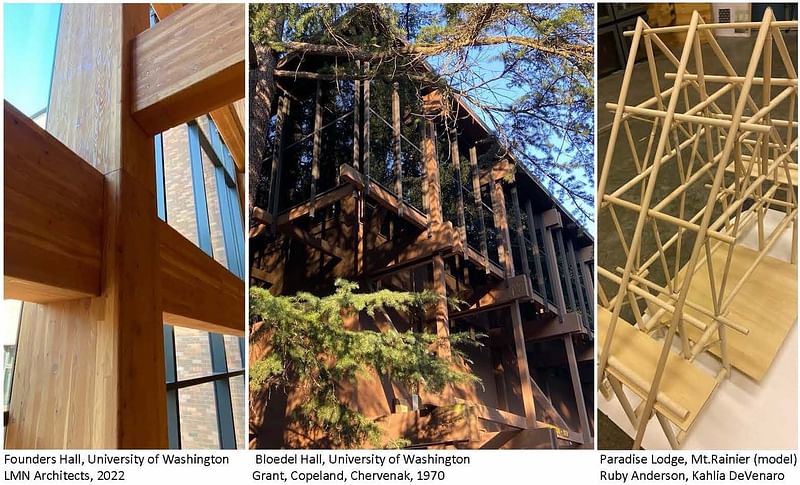
Description: "Mass timber has arrived as a significant part of a low-carbon construction future in the Pacific Northwest. While different courses and research projects at the University of Washington address particular, disciplinary aspects of mass timber buildings, none provide an overview of the complex alignment of natural resources, forestry industries, design sensibilities, structural realities and construction logistics that mass timber buildings connect to.
This course will provide a building technology-centered discussion of the current state of mass timber to students from many different parts of the University. This course would appeal directly to architecture, structural engineering and construction management students. Architecture students would leave the class with necessary expertise to schematically design with mass timber in their studio work. Structural engineering students would be able to understand the basic assembly and behavior of structural elements, different connection types, and further explore the lateral challenges of building with timber in a high seismic zone. Construction management students would be able to understand the logistical challenges of sourcing, sequencing, moisture control during construction and cost basics of mass timber for use in future courses." Read more here.
CIRC-LAM SMALL-SCALE MASS-TIMBER AND THE CIRCULAR ECONOMYInstructor: Jason Griffith from the University of Nebraska-Lincoln
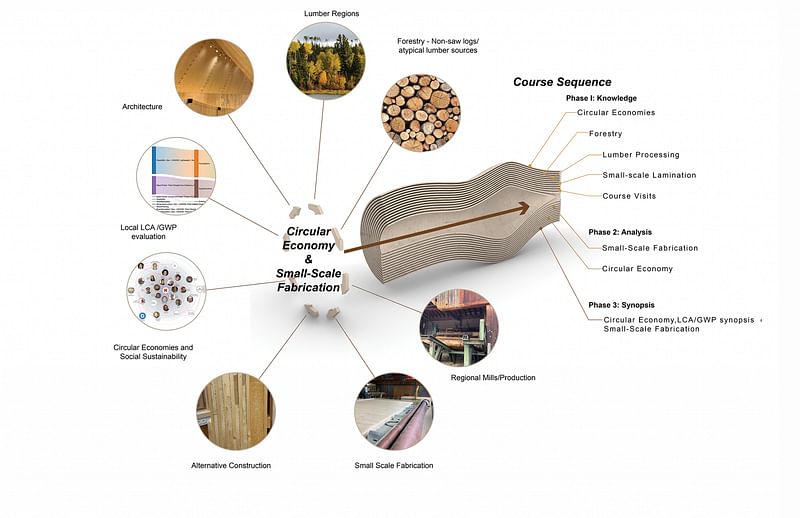
Description: "In a recent interview, Prof. Bohumil Kasal (director of the Fraunhofer Institute for Wood Research) suggested that the ability for mass timber to effectively reduce carbon emissions now depended on global diversification.
While it is clear that the rapid increase in production of mass timber (40K to 1.8 million m3 of CLT in 10 years) has produced a major contribution to carbon reduction, it still has a long way to go. While much of the discussion on GWP has centered upon large-scale mass production (Austria produces over 70% of global CLT), far less attention has been given to the production of localised, regionally specific facilities. From this perspective, mass timber has no comparable equivalent to concrete production, which, today, is a widely available, regionally adaptable construction material. For mass timber to challenge concrete in a meaningful way, it needs similarly adaptable forms of available technologies.
CIRC-LAM is a new course that provides students with knowledge of small-scale mass timber fabrication technologies and their impact on circular economies. It is a three-credit course that teaches students how to establish models of socially sustainable mass timber architecture. It explores how small-scale production (CLT, DLT, NLT, Glu-Lam etc.) can broaden outcomes in terms of sustainable futures." Read more here.
BEYOND CARBON: WHERE DOES YOUR WOOD COME FROM?Instructor: Laila Seewang from Portland State University
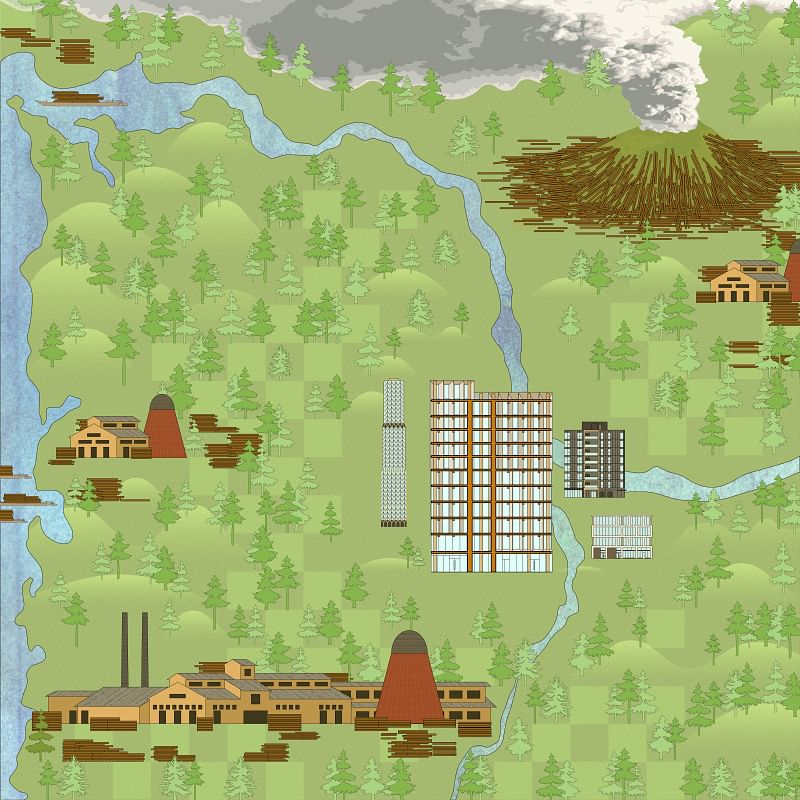
Description: "By designing with timber, we design forests. While buildings made of wood can positively impact carbon sequestration, not all wood is created equal. This course addresses a specific gap in historical research and contemporary practice alike: where does our wood come from and how ecologically positive is it, beyond carbon sequestration? Given the complexities in the industrialized timber material chain, it is practically impossible to answer that question.
The Course will map Oregon’s timber territory: the forests, mills, CLT plants, research centers, deconstruction companies and waste sites, using assemblage theory as a method to assess the ecological and social impacts of material choices. We hope to identify potential sites of improvement within this expanded notion of design, across scales, such as: the forest (making sure we know where our wood comes from); the mill (being able to track wood); the joint (developments in wood dowel joints for mass timber). By doing so, we hope to resituate designing with timber as a series of decisions in an expanded material context that involve forests, silviculture, cultural landscapes, milling, labor, investments, trade, and deconstruction." Read more here.
Honorable Mentions
- TIME FOR TIMBER - Tyler Swingle from the University of Texas at Austin
- GENERATION SOFTWOOD - Jana VanderGood & Patricia Cossard from the University of Maryland
Learn more about the Timber Education Prize here. View the 2022 winners here.

RELATED NEWS Winners of the 2022 Timber in the City competition showcase wood design in architecture

RELATED NEWS ACSA announces the 2023 Architectural Education Award winners


Share
0 Comments
Comment as :